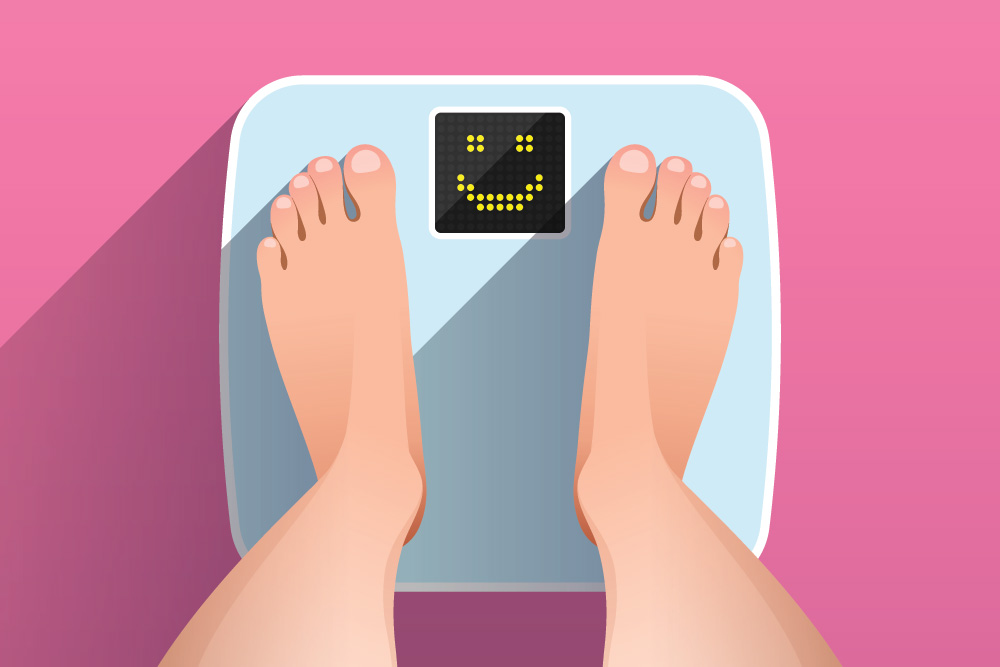In some way or the other, we let our body weight weigh heavy in our head. It is a sensitive issue many of us have faced, regardless of gender. With changes in your body weight, especially weight gain, there are several emotional challenges one has to battle with, firstly self-criticism, and blaming. Secondly, there are external and social aspects to face, like a friend/colleague commenting, family/relatives pointing it out, and several others passing unnecessary remarks about your weight. Dealing with such unwanted situations is difficult. At any given point, the focus should be on your overall wellness. But how can one put away those negative thoughts and frustration, and not get affected by it?

Ever wondered, why is it that losing weight always calls for a reason to celebrate whereas putting on weight has a negative notion associated with it?
We spoke to Clinical Psychologist, Mehezabin Dordi, Rehabilitation and Sports Medicine Department at Sir H.N. Reliance Foundation Hospital who explained how from a psychological point of view, society’s negative association with weight gain can be attributed to various factors, such as cultural ideals of beauty and societal pressures to conform to these ideals. Weight gain often triggers negative emotions due to these external influences.
Body image: Weight gain may lead to body image dissatisfaction, which can result in low self-esteem, poor self-worth, and negative self-perception.
Social stigma: Society often stigmatises individuals who are overweight or obese. This can lead to discrimination, social isolation, and feelings of shame, which can have a detrimental impact on mental well-being.
Emotional impact: Weight gain may trigger feelings of sadness, frustration, or anxiety, especially if it’s associated with health concerns.
Eating disorders: In some cases, weight gain can contribute to the development or exacerbation of eating disorders like binge eating disorder or bulimia, which have significant psychological implications.

Self-efficacy: For some individuals, unsuccessful attempts to control or manage their weight can erode their sense of self-efficacy and lead to feelings of helplessness and despair.
It’s essential to approach weight gain and its impact on mental health with sensitivity and without judgment. Encouraging a more positive and balanced perspective on body weight and self-worth can contribute to better mental health outcomes for individuals experiencing weight gain.
Weight does not only come with extra kilograms added to the body mass but also comes with added burden and stress to our mental health – insecurities, self-loathe, self-consciousness. How to overcome these insecurities healthily?

Here are 10 strategies to overcome challenges in a healthy manner.
Self-compassion: Practice self-compassion by treating oneself with the same kindness and understanding that one would offer to a friend.
Pep talk: Encourage oneself to have positive self-talk and challenge negative thoughts.
Set realistic goals: Setting achievable and realistic goals for weight management can boost self-confidence. This helps emphasise progress over perfection.
Seek professional help: Seek support from mental health professionals or therapists who specialize in body image issues, eating disorders, or self-esteem. Therapy can provide tools and strategies for managing insecurities.
Mindfulness & meditation: Practicing mindfulness and meditation can help one become more aware of their thoughts and feelings without judgment. It can promote self-acceptance and reduce anxiety.
Focus on being healthy: Shift the focus from appearance to overall health. It is essential to adopt a balanced lifestyle that includes nutritious eating and regular physical activity.
Acceptance of one’s body: Be accepting of one’s body and be grateful for what it can do. This can help shift the focus away from physical flaws.
Limit exposure to negative influences: Limit your exposure to social media that promotes unrealistic body ideals. Unfollow accounts or websites that trigger negative feelings.
Celebrate achievements: Celebrate non-scale victories and achievements that have nothing to do with weight. Recognise accomplishments in various areas of life to boost self-esteem.

Prioritising health goals over weight loss goals is always a wise choice.
Losing weight in an unhealthy manner not only increases the likelihood of regaining all the lost weight but can also lead to long-term health consequences. It’s crucial to take care of your mental health before embarking on a weight loss journey. Many people start this journey hoping that losing weight will help resolve issues like low self-esteem, but this isn’t always the case. In fact, if one doesn’t achieve the expected results, it can lead to further emotional distress, potentially worsening their mental health and triggering unhealthy coping mechanisms such as binge eating, which could result in further weight gain. Your mental well-being should take precedence over a specific number on the scale.
Not all weight gain is bad, and it’s essential to differentiate between different types of weight gain and their implications.
Sometimes, weight gain is necessary and even beneficial for one’s health. This typically applies to individuals who are underweight or recovering from illness or surgery. Gaining weight in these situations can be a sign of improved health and well-being.
Increasing muscle mass through strength training and exercise can lead to weight gain. This type of weight gain is often considered positive as it contributes to improved strength, fitness, and overall health.
Weight gain during pregnancy is a normal and necessary part of the process to support the growth and development of the baby. It’s not considered bad when it occurs within recommended guidelines.
As people age, their metabolism may slow down, and they may naturally gain some weight. This can be a normal part of the ageing process and may not necessarily be bad for one’s health. Some individuals intentionally gain weight as part of a structured plan to improve their health or athletic performance. This can be a positive choice when done with guidance from healthcare professionals.